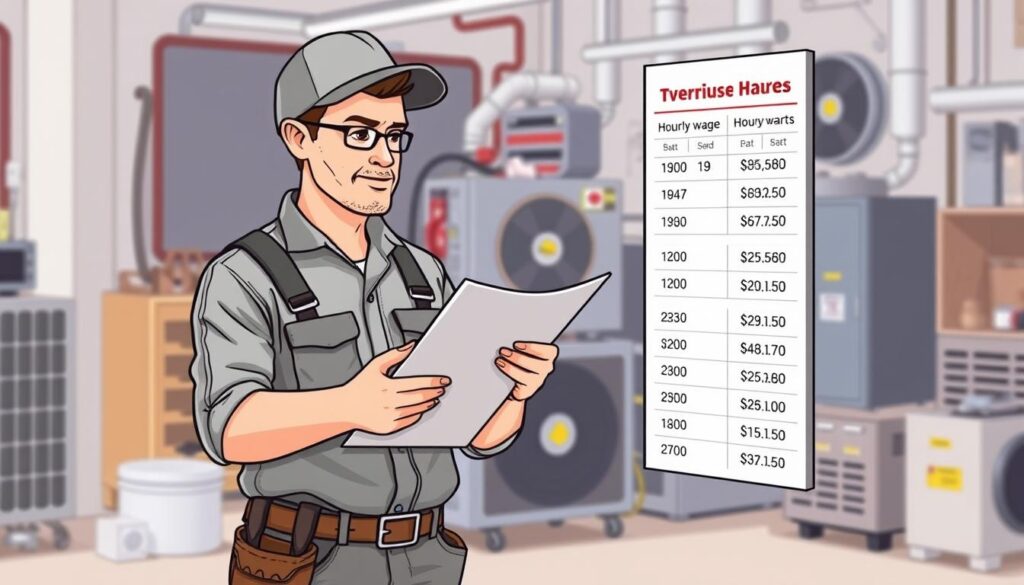
How Much Does An HVAC Installer Make? Are you curious about the financial side of an HVAC installation career? The HVAC world is not just about technical skills. It also offers a promising and well-paying career path for those who invest in their growth.
The Bureau of Labor Statistics reports that HVAC installers earn an average of $59,810 a year. This might surprise many who think this job doesn’t pay well. To understand how much an HVAC installer can earn, we need to look at several factors that affect their pay.
Your earnings in this field depend on your experience, where you work, your specialization, and any extra certifications you have. If you’re thinking about starting or growing your HVAC career, knowing the salary range is key to making smart choices.
Key Takeaways
- Average annual salary for HVAC installers is $59,810
- Hourly rates typically range around $28.75
- Salary varies significantly by region and experience
- Certifications can boost earning
- Career offers strong growth opportunities
Table of Contents
Understanding the Average HVAC Installer Salary Nationwide
Exploring HVAC installation careers means looking at salaries. HVAC installation offers good pay for those in the field. The Bureau of Labor Statistics gives insights into what HVAC pros can earn nationwide.
The national salary for HVAC installers is about $48,730 a year. But, this can change based on several important factors.
Base Salary Range Breakdown
HVAC installers can expect to earn within a certain range:
- Entry-level positions: $35,000 – $42,000
- Mid-career professionals: $45,000 – $55,000
- Experienced installers: $55,000 – $70,000
Critical Compensation Influencers
Several things affect HVAC installation pay rates:
- Geographic Location: Salaries change a lot by region
- Professional Certifications
- Specialized Skills
- Company Size and Type
Regional Salary Dynamics
| Region | Average Annual Salary | Cost of Living Impact |
|---|---|---|
| Northeast | $52,500 | High |
| Midwest | $47,200 | Moderate |
| West Coast | $55,300 | Very High |
| Southern States | $45,600 | Low |
Your earnings in HVAC installation depend on many things. Planning your career, improving your skills, and knowing the local market can boost your earnings.
How Much Does an HVAC Installer Make Based on Experience Level
Your earnings in the HVAC field grow with experience. Starting salaries are modest but offer big growth chances for skilled workers. Knowing how wages change can help you map out your career.
At first, HVAC jobs pay between $35,000 and $45,000 a year. These jobs are key for learning the basics and getting hands-on experience.
| Experience Level | Annual Salary Range | Skill Development |
|---|---|---|
| Entry Level (0-2 years) | $35,000 – $45,000 | Basic installation techniques |
| Mid-Level (3-5 years) | $50,000 – $65,000 | Advanced system diagnostics |
| Experienced HVAC Installer (6-10 years) | $65,000 – $90,000 | Complex project management |
As you gain more experience, your salary goes up a lot. Mid-level workers with 3-5 years of experience make $50,000 to $65,000. Those with 6-10 years of experience can earn $65,000 to $90,000.
- Invest in continuous training
- Pursue specialized certifications
- Develop advanced technical skills
Your salary can grow based on many things. These include your technical skills, specialized abilities, and where you work. Always learning and keeping up with high standards can help you earn more in HVAC.
Explore Our HVAC Shop
Looking for top-rated HVAC tools, parts, and accessories? Visit our shop and find the perfect solution for your needs.
Visit the ShopTop-Paying States for HVAC Installation Professionals
Your hvac technician salary can change a lot based on where you work. It’s key to know the HVAC career earnings in different places to make more money.
The United States has many chances for HVAC workers, with some states paying more than others. Where you work greatly affects how much you can earn.
Highest-Paying Metropolitan Areas
Some big cities offer great pay for HVAC jobs:
- San Francisco, California: Highest average salaries
- New York City metropolitan area: Competitive compensation
- Seattle, Washington: Strong technology-driven market
- Boston, Massachusetts: Robust industrial infrastructure
Cost of Living Adjustments by Region
It’s not just about how much you make. The cost of living is also key. Even if you make more in expensive cities, you might not have more to spend.
| State | Median HVAC Salary | Cost of Living Index |
|---|---|---|
| California | $72,000 | 149.9 |
| New Jersey | $70,800 | 125.5 |
| Washington | $70,500 | 117.7 |
State-Specific Salary Trends
Your earnings in HVAC can be affected by the state’s economy. Places with lots of manufacturing, tech, and building work usually pay more.
Look into local job markets, talk to other HVAC workers, and think about moving to find better pay in HVAC.
Commercial vs Residential HVAC Installation Salaries

Looking into hvac industry compensation shows big differences between commercial and residential HVAC. The size and complexity of projects greatly affect how much you can earn in these areas.
Commercial HVAC installers usually make more money because their work is more complex. They handle big systems in places like offices, hospitals, and factories. This requires special skills and a lot of technical knowledge.
- Commercial HVAC installations often involve more complex equipment
- Larger projects mean more sophisticated technical challenges
- Specialized training is typically required for commercial work
Residential HVAC installers work on smaller systems. Even though their work is important, they usually earn less than commercial installers. This is because residential projects are simpler and smaller.
“The more complex the system, the higher the average salary” – HVAC Industry Expert
Here are some salary differences:
| HVAC Sector | Average Annual Salary | Complexity Level |
|---|---|---|
| Residential HVAC Installation | $45,000 – $65,000 | Low to Moderate |
| Commercial HVAC Installation | $60,000 – $85,000 | High |
Your career path and what you specialize in can really affect your earnings in HVAC. Getting advanced training and certifications for commercial systems can greatly increase your salary.
Explore Our HVAC Shop
Looking for top-rated HVAC tools, parts, and accessories? Visit our shop and find the perfect solution for your needs.
Visit the ShopEssential Certifications and Their Impact on Earnings
To boost your HVAC career earnings, focus on professional growth. Certifications are key to increasing your value and wages. They help you earn more and build a strong reputation.
Certifications show you’re an expert in HVAC. They prove your skills to employers and clients, leading to better pay.
NATE Certification Benefits
The North American Technician Excellence (NATE) certification is top-notch for HVAC pros. Getting it can really up your wages.
- Validates technical knowledge and skills
- Increases employability
- Potentially raises hourly rates by $2-$5
- Demonstrates commitment to professional growth
EPA Certification Requirements
The Environmental Protection Agency (EPA) Section 608 Technician Certification is a must for HVAC pros working with refrigerants. It’s not just a rule; it’s a big step up in your career.
| Certification Type | Wage Increase | Career Impact |
|---|---|---|
| Type I (Small Appliances) | 3-5% salary boost | Entry-level opportunities |
| Type II (High Pressure) | 5-7% salary boost | Medium complexity systems |
| Type III (Low Pressure) | 6-8% salary boost | Advanced system expertise |
| Universal | 8-10% salary boost | Comprehensive professional qualification |
Additional Professional Certifications
There are more certifications beyond NATE and EPA. Look into ones that match your career goals.
- R-410A Certification for modern refrigerant systems
- Commercial HVAC specialization
- Energy efficiency expert credentials
- Building performance certifications
Getting these certifications shows you’re serious about being the best. It can really change your career earnings.
Benefits and Additional Compensation Packages
Looking into yearly earnings for HVAC pros, it’s key to see the whole compensation package. Your total pay goes beyond just your base salary in the HVAC field.
Most HVAC employers offer great benefits that boost your earnings. These packages aim to draw and keep skilled techs in a tough job market.
- Health Insurance Coverage
- Retirement Savings Plans
- Performance-Based Bonuses
- Tool and Equipment Allowances
- Paid Time Off and Vacation Days
HVAC pay often comes with special perks for tech jobs. Many companies give extra money for things like:
- Signing Bonuses for New Hires
- Travel Reimbursement
- Continuing Education Support
- Safety Performance Rewards
Technicians who know how to talk about their total pay can earn more as HVAC pros. Your benefits can add a lot of value, possibly increasing your pay by 20-30%.
Smart professionals look at pay as a whole, including both direct wages and benefits.
When checking out job offers, look at the whole pay package. The right benefits can greatly improve your financial future in HVAC.
Career Growth and Advancement Opportunities
The HVAC industry offers exciting pathways for professionals looking to grow their careers. As you gain experience, many opportunities emerge. These can greatly increase your income and professional standing.
Starting as an entry-level HVAC installer, you’ll find many ways to boost your wages. Your career path can include several strategic options:
- Technical Specialization
- Management Roles
- Independent Contracting
- Business Ownership
Progression from Entry-Level to Senior Positions
Your career advancement typically follows this progression:
- Apprentice Technician – Learning fundamental skills
- Junior HVAC Installer – Gaining practical experience
- Senior HVAC Technician – Advanced technical expertise
- HVAC Team Lead/Supervisor – Management responsibilities
Specialization Options and Their Pay Scales
Specialized HVAC roles can dramatically increase your earning. Consider focusing on:
- Commercial HVAC Systems
- Industrial Refrigeration
- Green Technology Installation
- Smart Home Climate Control Systems
The Bureau of Labor Statistics predicts a 9% job growth for HVAC professionals. This shows strong opportunities for ambitious technicians seeking career advancement and higher wages.
Explore Our HVAC Shop
Looking for top-rated HVAC tools, parts, and accessories? Visit our shop and find the perfect solution for your needs.
Visit the ShopOvertime and Performance-Based Pay Structures

HVAC installation pay rates can go up a lot with overtime and performance pay. The Fair Labor Standards Act gives important rules for HVAC pros to earn more each year.
Knowing overtime rules is key to making more money. Nonexempt HVAC installers get 1.5 times their standard hourly rate for more than 40 hours a week. This opens big money chances for hardworking techs ready for extra shifts.
- Standard overtime rate: 1.5x base hourly wage
- Potential weekly overtime earnings: $225-$675 extra
- Annual overtime income: $11,700-$35,100
Performance pay adds to your income beyond regular wages. Many HVAC firms have bonus plans for:
- Fast and efficient installations
- Good customer feedback
- Meeting or beating monthly goals
Your earnings can really jump when you mix base pay, overtime, and bonuses. Skilled HVAC installers who use these pay models well can earn a lot more each year.
Pro tip: Keep track of your hours well and know your company’s overtime rules to get the most pay.
Industry Demand and Job Market Outlook
The HVAC industry is growing fast, opening up exciting career paths. The Bureau of Labor Statistics predicts a 9% increase in job opportunities for HVAC mechanics and installers from 2023 to 2033. This shows strong demand and job security.
Your earnings in the HVAC field can rise with this growing market. New tech and energy-saving needs are driving growth. Smart homes and green cooling systems are creating new job areas, increasing pay.
- Emerging technologies creating new job roles
- Growing demand for energy-efficient systems
- Increased focus on environmental sustainability
- Expanding residential and commercial construction markets
Several factors are pushing the industry forward:
- Climate change adaptation strategies
- Renovation of aging infrastructure
- Advanced refrigeration and cooling technologies
- Rising investments in green building solutions
“The HVAC industry represents one of the most stable and promising career paths in the current job market.” – Industry Expert
As an HVAC pro, you’ll find many job chances in homes, businesses, and factories. The field keeps changing, keeping skilled workers in demand. This means good pay and a promising future.
Explore Our HVAC Shop
Looking for top-rated HVAC tools, parts, and accessories? Visit our shop and find the perfect solution for your needs.
Visit the ShopTraining and Education Requirements for Higher Pay
To move up in your HVAC career, investing in education is key. The right training can boost your starting salary and future earnings. Knowing the educational paths available helps you choose wisely for your career.
Education is vital for growing in the HVAC field. Several educational paths can increase your earning power:
Technical School Programs
Technical school programs give you a solid foundation. They offer:
- Hands-on technical training
- Preparation for industry-standard certifications
- Deep understanding of HVAC systems
- Practical skills development
Apprenticeship Opportunities
Apprenticeships are a great way to get hands-on experience while earning. They combine:
- Classroom learning
- Paid on-the-job training
- Mentorship from experts
- Gradual skill growth
Continuing Education Impact
Keeping up with new technologies can greatly enhance your salary. Continuous learning shows commitment and expertise to employers. This can lead to better-paying jobs.
Professional growth is a continuous journey of learning and skill development.
By choosing the right education and training, you can turn a starting job into a rewarding career with good pay.
Conclusion
The HVAC installation industry is full of great career chances with good pay. When you look into how much an HVAC installer makes, you’ll see it’s a job with big earning possibilities. The pay for HVAC installers changes a lot based on their experience, where they work, and their special skills.
Your career path in this field depends on always learning and getting better at your job. Getting the right certifications, keeping up with new tech, and getting hands-on experience can really boost your pay. Places with a big need for climate control services usually pay more.
Planning your career well is key to making more money. By focusing on special skills, getting advanced certifications, and being open to different work settings, you can climb up the career ladder. The HVAC installation field has many ways for ambitious people to make a good living and have a stable career.
Your success in this field depends on your technical skills, being able to adapt, and a commitment to keep learning. With the right strategy, you can turn your HVAC installation career into a rewarding and fulfilling journey.

